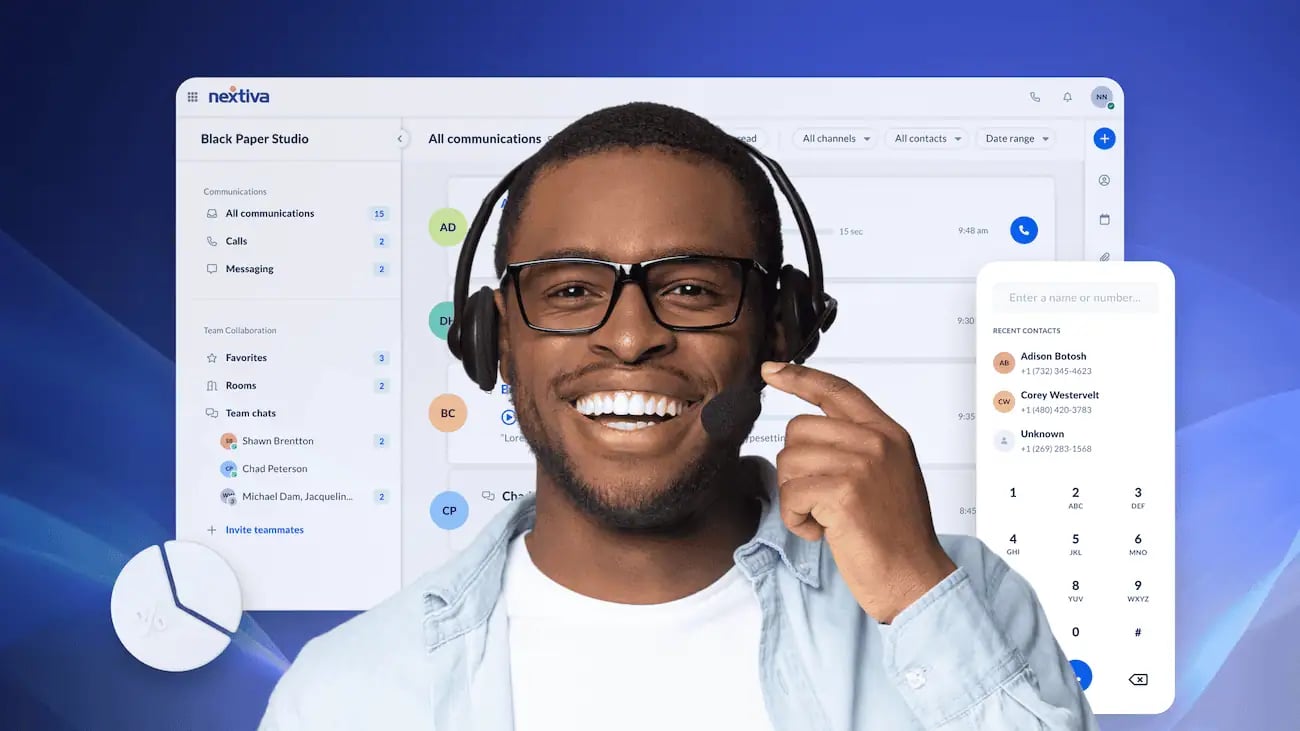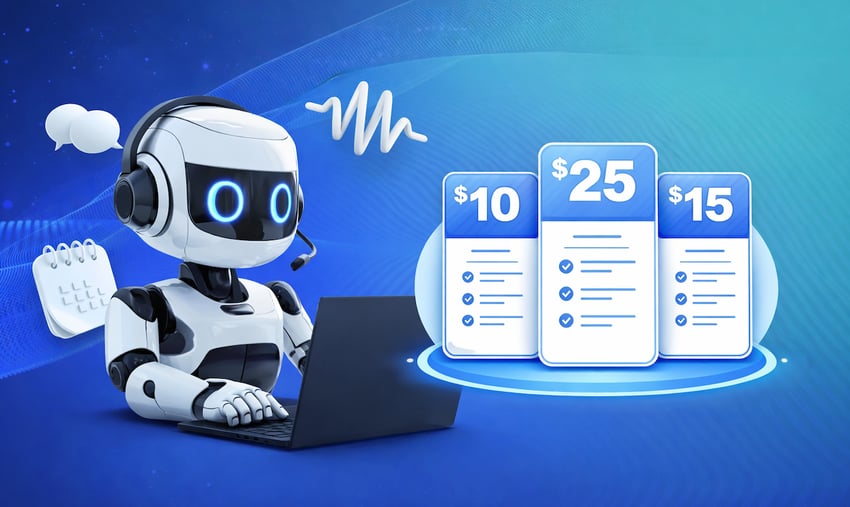What Is a Contact Center for Small Business?
Before we look at the providers, let’s first clarify what a contact center is.
Unlike a traditional call center, which handles only telephone calls, a contact center is a central point of contact for all customer communication. It combines telephony, email, web chat, SMS, and social media on a single platform.
For small businesses, this isn’t just a nice extra, but a must for efficiency and growth. The main benefits for small teams using a contact center include:
- Omnichannel customer view: Agents can see a customer’s entire interaction history (calls, chats, emails) on a single screen.
- Faster, smarter solutions: You can route customers to the agent best suited to help (e.g., billing or technical support) using automatic call distribution (ACD) and skills-based routing, improving first-call resolution (FCR).
- Reduced app switching: Integrating your CRM and business tools means agents don’t have to switch context between tools. They can view customer data, take notes, and manage interactions all from one unified platform, saving time with every interaction.
Your choice of contact center software as a small business will impact how you work and how you serve your customers for years to come. When deciding on a system, there’s a lot to consider, such as receiving inbound calls, making outbound calls, applying specific call treatments, and configuring custom call queues.
In this post, we address the must-haves when it comes to contact center software, introduce new features, and highlight the right solution for you.
Spoiler alert: The top ten contact center software systems for small businesses are:
Evaluating contact centers? Get the buyer’s guide.
This guide reveals the five pillars of a modern platform, key questions to ask, and red flags to avoid.
Top 10 Contact Center Software Providers at a Glance
| Software | Best for | Starting price (billed annually) | Key features |
| Nextiva | All-in-one CX platform for growing teams | $75/user/month | Omnichannel routing, AI transcription, WEM/QA, 99.999% uptime |
| Ringover | Sales and support teams | $21/user/month | Unlimited international calls, sales CRM integrations, AI summaries |
| Sprinklr | Enterprises needing a unified AI platform | $199/seat/month | Full omnichannel (30+ channels), advanced AI Agent Assist, unified CXM |
| Five9 | Data-driven teams needing advanced AI | $119/user/month (3-year contract) | Conversational IVR, workflow automation, WEM/QA, agent assist |
| LiveAgent | Help desks that need affordable omnichannel | $15/agent/month | Unified inbox, ticketing system, IVR, callback requests |
| CloudTalk | Scaling SMBs and sales teams | $49/user/month | Local numbers (160+ countries), power dialer, AI call summaries |
| Freshcaller | Global businesses that need a simple phone system | $39/agent/month | Phone numbers in 90+ countries, advanced IVR, free plan available |
| 3CX | Tech-savvy SMBs wanting PBX control | $275/year (for 1-15 users) | Not per-user, on-prem or cloud, live chat/SMS, call queues |
| RingCentral | Businesses wanting unified UC and CC | $65/user/month (RingCX) | Omnichannel, AI tools (virtual agents), smart routing, UC integration |
| Grasshopper | Solopreneurs needing a virtual number | $55/month (Small Business plan) | Virtual phone system, works on existing devices, custom greetings |
Best Contact Center Providers for Small Businesses
Affordable picks & price tiers
While some providers aim for the enterprise, many offer excellent, affordable starting points for small businesses. We’ve badged our top picks and best call center software for small businesses under $50. Here’s a breakdown of what to expect at each price tier:
| Price tier (per user/mo) | Common providers | Pros | Cons |
| < $50 | LiveAgent, CloudTalk, Freshcaller | Highly affordable, great for voice-first teams, fast setup | May lack advanced AI, WEM/QA, or have fewer digital channels |
| $50 – $80 | Nextiva, RingCX, Grasshopper | Balanced feature set, strong integrations, good for growing teams | Advanced AI or WEM features may be add-ons or in higher tiers |
| $80+ | Five9, Sprinklr, Nextiva | Enterprise-grade AI, full omnichannel, deep analytics | Higher cost, can be complex to implement without support |
1. Nextiva
Nextiva offers a comprehensive platform that combines its business phone system, video conferencing, and a powerful contact center solution. Small businesses get a unified communications platform for all their communication and business needs.
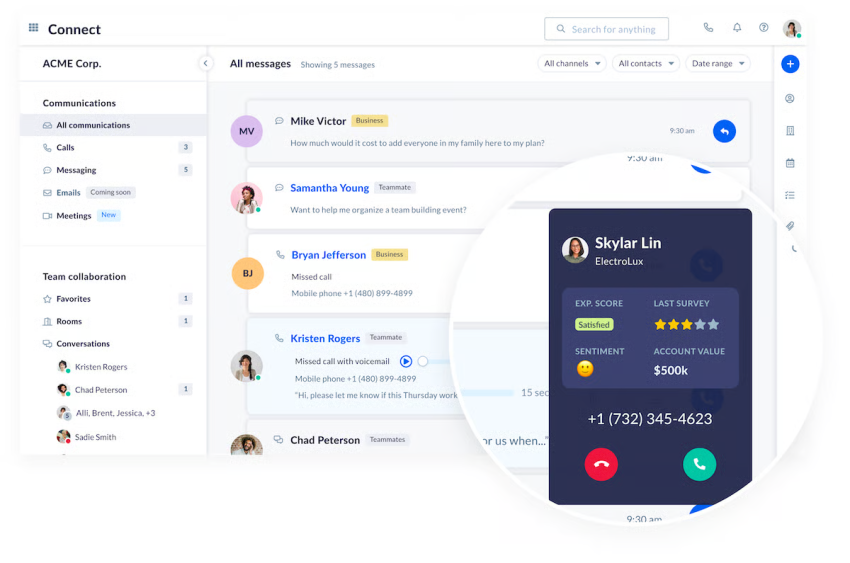
You can choose from inbound, outbound, or blended contact center software alongside your core internal communications app. You can expect a wide range of features, even in the basic call center package:
- Call routing
- Interactive voice response (IVR)
- Automatic call distribution (ACD)
- Speech analytics
- Reporting and dashboards
- Mobile app for instant access
- Options to add email, chatbots, SMS, and social media
For outbound call centers, expect computer telephony integration, a power dialer or predictive dialer, and a ton of advanced reporting options to streamline sales. Out-of-the-box customer relationship management (CRM) system integrations include:
- Salesforce
- Microsoft Dynamics
- Microsoft Teams
- HubSpot
- Zendesk
- Zoho
- Oracle Sales Cloud
- Workbooks
- ServiceNow
- SugarCRM
- Act! CRM
- Lotus Notes
- ConnectWise
- GoldMine
- Bullhorn
Nextiva customers love the assisted implementation, ease of setup, and friendly and knowledgeable support team.

“I can’t really say enough about the support. Nextiva is top-notch when it comes to any issues that I have. It is thorough, responsive, and professional. From my perspective as the IT Director, it’s really the forefront of my requirements for any vendor that we deal with. We have to be able to reach out to support and resolve an issue very quickly.”
— Rich Sparkman
 Pros
Pros
Quick and simple setup
Affordable for small businesses
24/7 support and 99.999% uptime
 Cons
Cons
No free trial
No support for on-premises deployment
Lacks of out-of-the-box integration for some niche business apps
Pricing: Nextiva’s core call center plans start at $75 per user per month, but some call center features are also available in the lower-end plans.
2. Ringover
Ringover is cloud-based software that is mainly used by small and medium-sized businesses. It offers unlimited international calls to various destinations and has robust basic voice call capabilities. The call center platform includes advanced routing features to enhance call efficiency.
With a focus on sales and recruitment, Ringover integrates with specialist CRMs like Bullhorn, TextUs, Sense Messaging, and Loxo. It also integrates with major platforms like Zoho and Microsoft Dynamics.
If setup time is important to you, Ringover boasts that you can get going in under 15 minutes. If you are willing to spend a little extra time (and money), Ringover supports email, SMS, and social media.
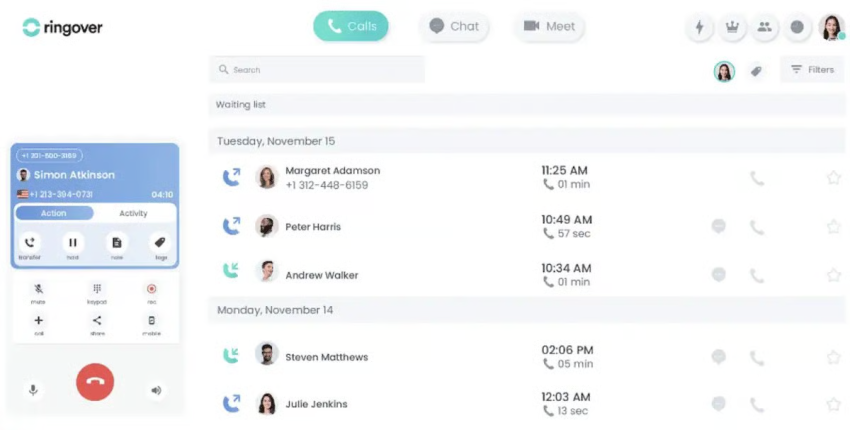
On the top plan, you get AI features like automated call summaries, call center analytics, and AI-powered chatbot building capabilities.
 Pros
Pros
Unlimited calling to over 110 destinations
Robust basic call routing
Specialist in sales and recruitment
 Cons
Cons
Less popular integrations
Advanced functionalities not as robust as competitors
Lack of call center market exposure
Pricing: Ringover’s plans with contact center features start from $21/user/month (billed annually), but the conversation intelligence tool starts at $39 per user per month.
3. Sprinklr
Sprinklr offers a comprehensive omnichannel contact center, including calls, emails, social media, and messaging. This virtual call center software integrates with a wide range of CRM platforms, including:
- Freshdesk
- IBM Watson
- Microsoft Dynamics
- Salesforce
- SAP
- ServiceNow
- Zendesk
Support options include phone, chat, and email, with dedicated account managers for enterprise plans. Sprinklr’s marketing messaging focuses on improving customer support metrics, so hopefully, they practice what they preach.
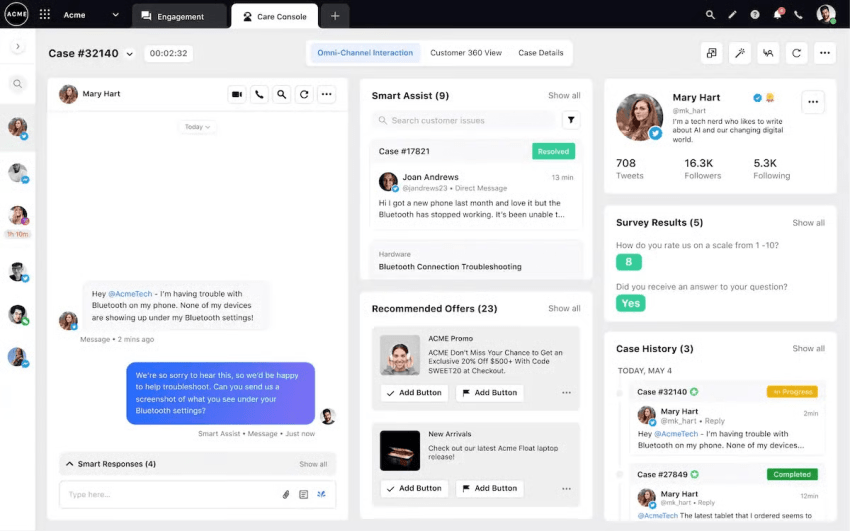
 Pros
Pros
Supports 30+ communication channels
Dedicated account manager for enterprise plans
Includes a wide range of CRM integrations
 Cons
Cons
The choice of solutions can be overwhelming for small businesses
No dedicated account manager for smaller teams
Has the potential for complex setups
Pricing: Sprinklr doesn’t publish prices for most of its enterprise solutions. To get a quote, contact Sprinklr directly to discuss your business needs, as pricing is tailored. Some sources mention a cheaper “Advanced” plan with a publicly available price per user per month, which often only applies to the basic Sprinklr Social product and comes with limitations.
Here’s a full guide on Sprinklr pricing plans.
4. Five9
Just because you’re a small business doesn’t mean you’re not looking for the most advanced features. If you want an advanced AI-powered contact center solution, Five9 hits the nail on the head. You get what you’ve come to expect as stock call center features, like call queuing, IVR, and skills-based routing.
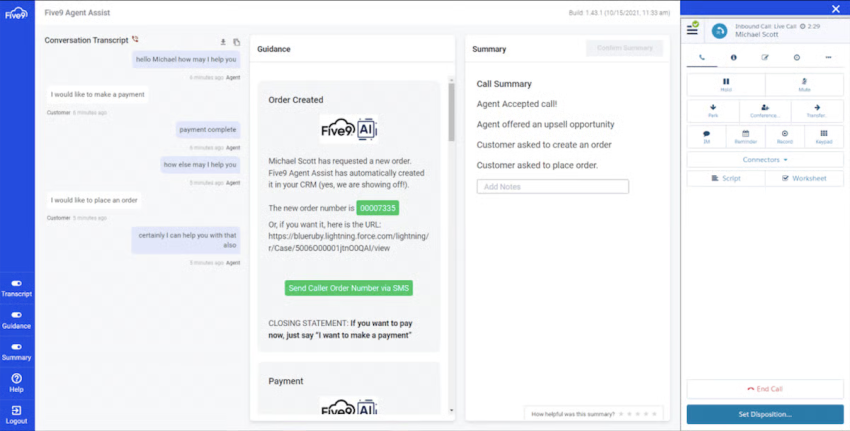
But where Five9 really excels is in its ability to use AI to generate reports and provide sentiment analysis on your customer transactions. If you have a data-driven organization with a lot of customers and a decently sized service team, Five9 can be a great way to get control of your contact center, with features that include:
- Agent assist
- Call recording and transcription
- Workflow automation
- Conversational IVR
- Digital engagement
- Quality assurance
- Workforce management
 Pros
Pros
Longstanding AI legacy
Focus on automation
Enterprise scalability
 Cons
Cons
High price point for small businesses
Can be overwhelming for new users
Needs a separate provider for VoIP
Pricing: Five9’s plans start at $119 per user per month, typically requiring a multi-year contract and minimum seat counts.
5. LiveAgent
LiveAgent is an affordable option best known for its ticketing and help desk software. However, with a user-friendly interface, it is a great choice if call center costs are your primary concern and your core function is customer service.
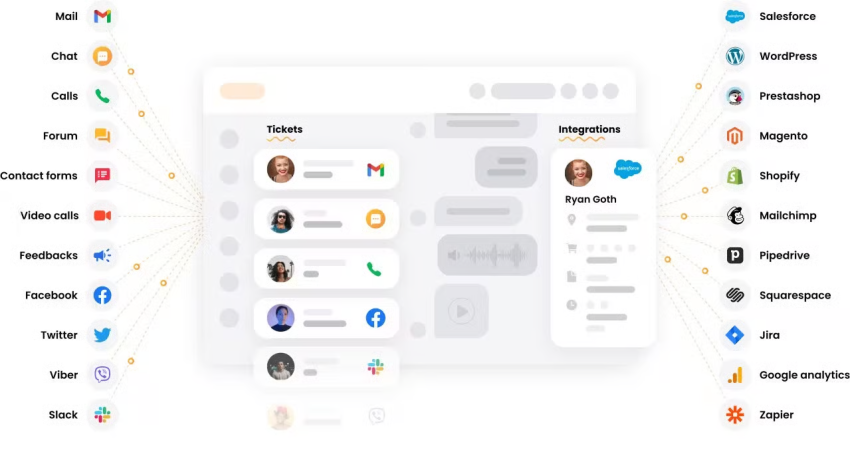
Think of LiveAgent as a shortcut to a call center software solution, with help desk features like:
- Unified multi-channel inbox
- Ticketing system
- Configurable business hours
- Canned responses
- Contact forms
- Time tracking
It also comes with basic call center features like:
- IVR
- Call back requests
- ACD
- Smart call routing
- Call transfers
- Call recording
You also get out-of-the-box integrations with popular CRMs like Zoho, HubSpot, and Freshsales.
 Pros
Pros
Great alternative for budget-conscious businesses
Thirty-day free trial
Adds extra help desk features
 Cons
Cons
Not a full-feature call center
Lack of call center market exposure
Can result in a lengthy implementation
Pricing: LiveAgent’s base plan with call center capabilities starts at $15 per agent per month, but it doesn’t have the most advanced calling features. The top plan could cost up to around $69 per agent per month.
6. CloudTalk
CloudTalk is designed for small to mid-sized businesses and offers comprehensive call center functionality with AI-enhanced features. The platform provides clear call quality and is built for teams looking to scale efficiently.
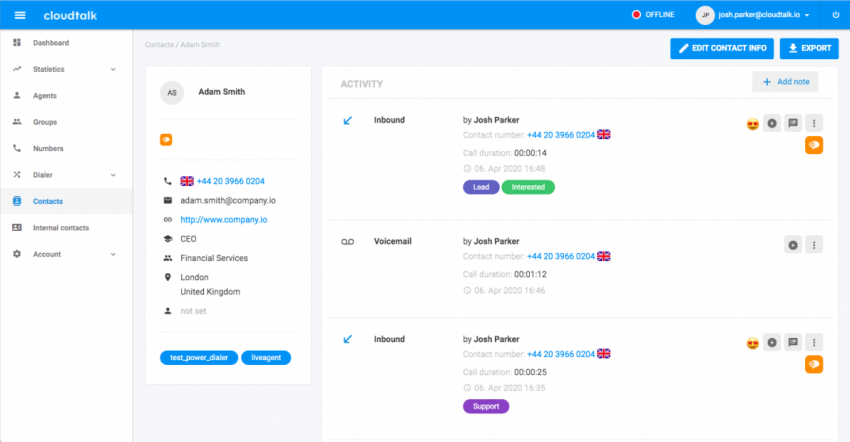
Key features for small businesses:
- Local numbers from 160+ countries for a global presence
- AI-powered call transcription and summaries (add-on)
- Power dialer and campaign management for outbound sales
- Real-time analytics and customizable dashboards
- Easy setup in minutes with no technical expertise required
 Pros
Pros
Easy to set up and user-friendly
Widespread international coverage
Powerful AI features
 Cons
Cons
Higher starting price for basic functionality
Advanced features on premium plans
Requires a strong internet connection
Pricing: CloudTalk’s all-inclusive plan costs $49 per user per month and requires a minimum of 3 licenses.
7. Freshcaller
Freshcaller is a cloud-based contact center solution designed to help small businesses manage their communications. With phone numbers available in 90+ countries, it’s good for small businesses looking to establish a global presence quickly.
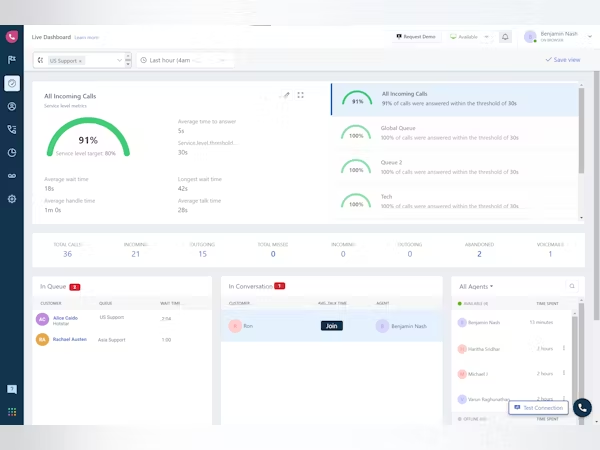
Key features for small businesses:
- Advanced IVR with voice-activated options
- Call recording with automatic transcriptions
- Integrations with popular CRMs and helpdesk tools
- Free plan available for startups with minimal calling needs
 Pros
Pros
Offers a free plan for startups
No hardware needed, cloud-based
Integrates with popular CRMs
 Cons
Cons
Some features are only available in paid plans
Limited analytics on the lower tiers
International calls can be expensive
Pricing: Freshcaller’s Pro plan costs $39 per agent per month and includes the necessary advanced call center features.
8. 3CX
Often, the entry-level phone system for very small businesses (under 20 users), 3CX includes phone system and call center features. However, this carries a different kind of cost. There are annual hosting charges and extra fees if you need support.
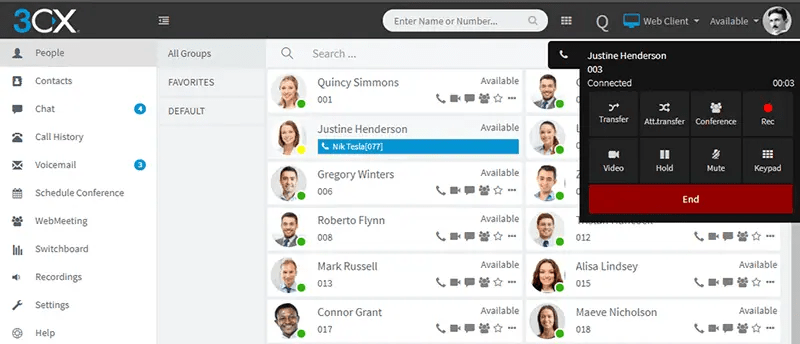
Key features for small businesses include:
- No per-agent pricing (one flat annual fee)
- Advanced call center features, including queues and reporting
- Live chat, SMS, and WhatsApp integrations
 Pros
Pros
Free for basic access
Satisfactory for core telephony requirements if nothing else is needed
Recently added multichannel functionality
 Cons
Cons
Significant number of poor reviews
Complex to configure when you need to scale up or add new features
Must pay for support
Pricing: 3CX’s PRO plan starts at $275 per year (for 1-15 users/4 simultaneous calls).
9. RingCentral
RingCentral is a cloud-based, AI-powered contact center and unified communications platform designed to support small businesses with scalable and feature-rich communication tools. It combines voice, video, messaging, and omnichannel customer engagement in a single app, enabling small businesses to manage sales and support efficiently.
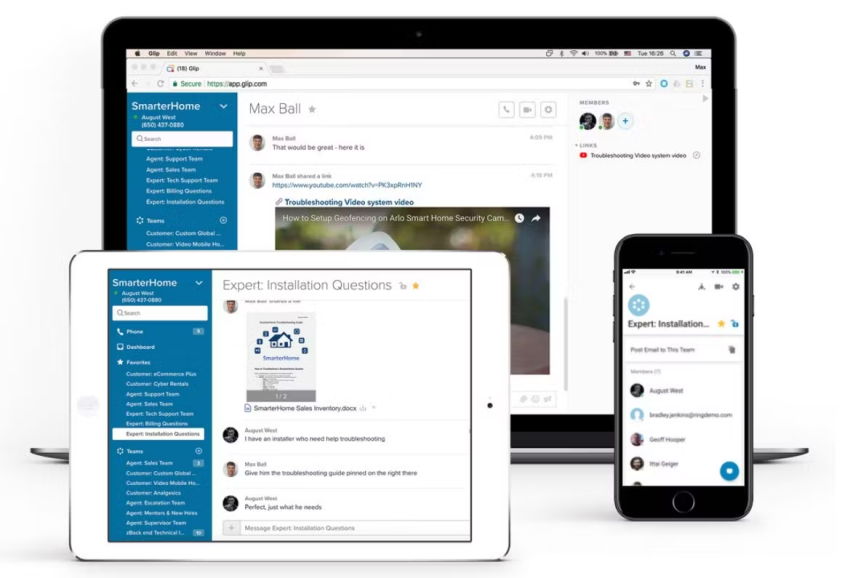
Key features for small businesses:
- Omnichannel support (voice, SMS, web chat, email, social)
- AI tools like virtual agents, real-time call transcription, and sentiment analysis
- Smart routing (skills-based and data-driven)
- Integration with popular business apps and CRM systems
 Pros
Pros
Comprehensive omnichannel and AI-powered features
Scalable platform suitable for growing small businesses
Strong integrations and customizable workflows
 Cons
Cons
Higher starting price compared to some competitors
Some advanced features require costly add-ons
No voice-only plans; can be complex for very small teams
Pricing: RingCentral’s contact center offering, RingCX, starts at $65 per user per month, with add-ons for advanced AI and customer experience analytics.
10. Grasshopper
Grasshopper is a virtual phone system built specifically for small business owners and entrepreneurs. It’s designed to provide professional phone features without the complexity or cost of traditional business phone systems. While it includes basic call center features, its selling point is a reduced functionality set, ideal for very small businesses with simple inbound call needs.
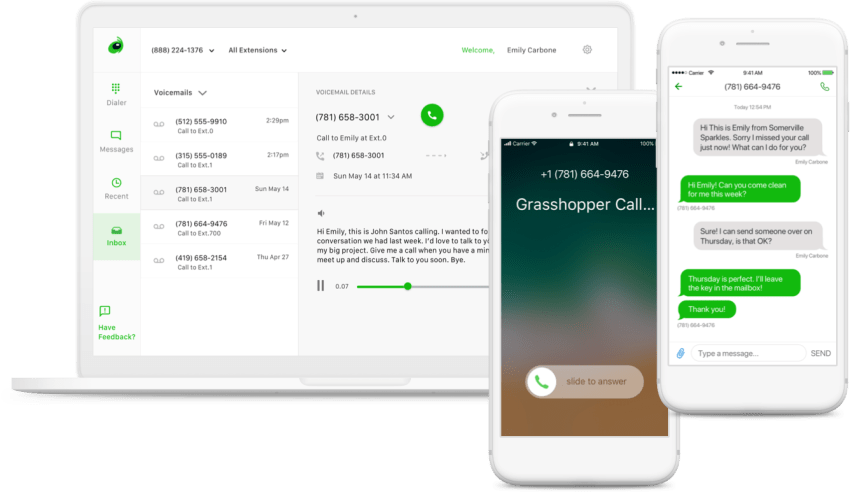
Key features for small businesses:
- Virtual phone system that works on existing devices
- Professional business number
- Custom greetings and extensions
- Voicemail transcription and business texting
 Pros
Pros
Quick, simple setup
Mobile-first, works on any device
Affordable entry pricing
 Cons
Cons
Lacks advanced call center features
No global numbers beyond the US and Canada
Basic reporting and analytics
Pricing: Grasshopper’s Small Business plan with call center functionalities starts at $55 per month.
What Should Small Businesses Look for in Call Center Software?
If you do nothing else when comparing call center software, make sure to look out for these five things:
1. Rapid onboarding with a user-friendly interface
When you lack in-house IT, the time taken to get agents up to speed is vital. Look for an intuitive interface that’s easy to navigate, especially for non-technical users. If a vendor suggests a lengthy onboarding period, it’s likely too complex for a small business.
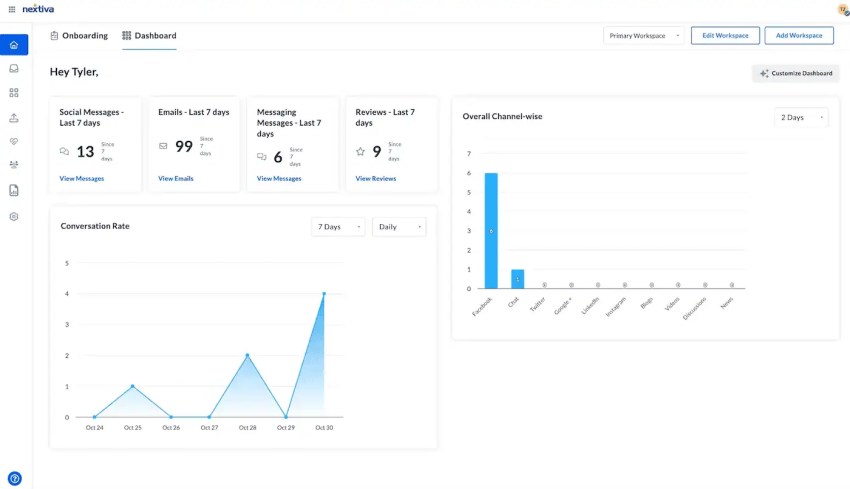
2. Built-in CRM integrations
Your call center software will rarely be the only tool your agents work with. Think about other key business apps they’ll be using daily and ensure your chosen call center software integrates with them. CRM integrations need to be available out of the box to avoid setup delays and free up internal resources that are already dedicated elsewhere.
Integration between your call center software and your most-used apps ensures that all customer data, like past interactions and purchase history, is readily available to agents. Failure to integrate can lead to lower customer satisfaction, siloed information, and duplicated effort.
Here’s a sample integration matrix. Look for native integrations, as they are easier to set up than API-based ones.
| Provider | Salesforce | HubSpot | Zendesk | Sync Method |
| Nextiva | Native | Native | Native | Bi-directional |
| Ringover | Native | Native | API | Bi-directional |
| LiveAgent | Native | Native | Native | Bi-directional |
| RingCX | Native | Native | Native | Bi-directional |
(This is a sample; always check with the provider for specific sync objects. See Nextiva's Integration Universe for a full list.)3. Unlimited vendor support
As a small team, you need support when something goes wrong. Choose a vendor known for its exceptional customer service, with readily available support options (phone, chat, and email). If you operate 24/7, for example, make sure you can reach your vendor at any time through your preferred method of contact.
Look for plans that include unlimited support to ensure you get the help you need when you need it to customize the software or troubleshoot any issues.
4. Cost-effectiveness without barriers to adoption
As a smaller business, you don’t have the luxury of unlimited budgets and countless rounds of funding. Budgetary constraints rule out some larger call center providers that have minimum spend thresholds and high prices because they include functionality that you simply don’t need.
Look for a solution that offers great value, with a clear return on investment for your niche requirements. Getting started must be simple. It’s no good choosing a solid solution that represents great value if it’s going to take six months to implement and requires engineers on-site constantly.
This may work in large businesses with formal change programs, but it doesn’t suit the more reactive, urgent small business needs.
5. High call quality and optional digital channels
If your call center is your first line of support or the first sales instance in your business, the number one requirement is clear call quality.
Check for HD calling, MoS scoring, and call monitoring metrics to ensure your chosen provider is at the top of its VoIP game. Some vendors stem from a VoIP background, whereas others have created call center for startups with no previous voice experience.
If you’re interested in adding omnichannel routing outside of voice calls (e.g., SMS, email, web chat, or social media), make sure your chosen vendor is experienced in these, too. Be wary of providers that have only voice experience and are adding on extra channels without the necessary experience.

Essential Call Center Features Every Small Business Needs
The number of possible call center features is overwhelming. Instead of a feature-by-feature comparison, shortlist providers that offer these high-quality basics:
- Automatic call distribution (ACD): Routes incoming calls to available agents based on predetermined rules. You can distribute calls based on caller ID, business hours, support level, or IVR selections.
- Interactive voice response (IVR): Offers self-service options or basic inquiries, reducing agent workload and wait times. Callers choose the right option and get matched with the correct department or queue.
- Call recording & call monitoring: Basic call recording stores all your calls for compliance. Advanced recording helps improve training and quality assurance (QA). You can listen to any call and set up automated workflows to review calls for key criteria.
- Dashboards & reporting: With access to the right call center metrics (volumes, wait times, resolution rates), you can identify areas for improvement. You can have a board to track agent performance or a supervisor-specific dashboard for a holistic view.
- Digital service channels: Manage email, web chat, SMS, and even social media messages from the same agent dashboard used for calls.
- Workforce engagement (WEM) & QA: Useful for contact center managers, WEM tools include QA scorecards (to grade interactions fairly), performance dashboards, and coaching tools. This is how you ensure quality and train your team effectively.
- Knowledge base & agent assist: Provide agents with real-time help. An internal knowledge base can pop up relevant articles as a customer speaks, or AI Agent Assist can suggest answers, so agents never feel lost.
- Security & compliance: Look for platforms that offer security (like data encryption) and can help you maintain compliance with regulations like PCI (for credit cards) or HIPAA (for healthcare).
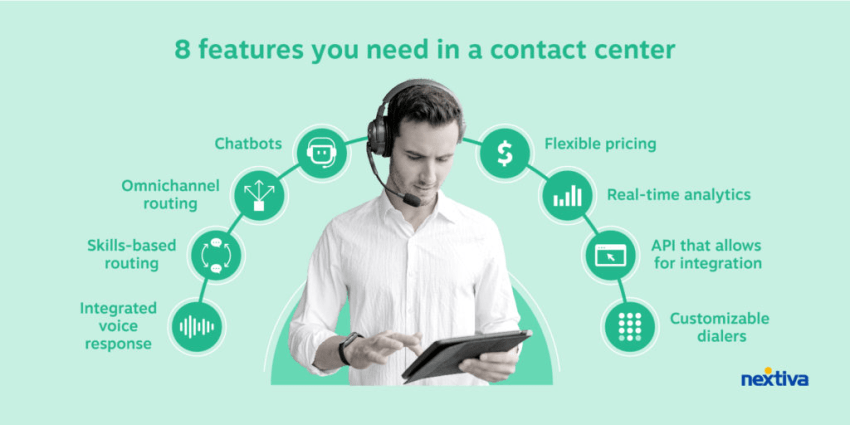
How Much Does a Small Business Contact Center Cost? (Costs & TCO)
Contact center pricing can be confusing. It’s not just the per-seat price; you must consider the total cost of ownership (TCO).
Here are some common pricing models you’ll come across:
- Per-user, per-month: The most common model. You pay a flat fee for each agent (e.g., $65/user/month).
- Usage/minutes: Less common, but you may pay for blocks of minutes, especially for toll-free numbers.
- Add-ons: Be careful! Features like AI summaries, extra digital channels, or WEM tools can be add-ons that increase the monthly bill.
Hidden costs to watch for (TCO):
- Implementation & setup: Is there a one-time fee?
- Training: Is it included, or do you pay for it?
- Phone numbers: Do you pay monthly for each DID or toll-free number?
- Toll-free minutes: Are they pooled, or do you pay a per-minute rate?
- Channel add-ons: Does adding web chat cost an extra $20/user?
- Integrations: Is your must-have CRM integration included, or is it a custom-paid job?
Sample TCO examples (monthly estimates):
Here’s how those costs can add up for different team sizes.
| Team size/profile | Seat cost (estimate) | Other costs (estimate) | Estimated total (monthly) |
| 5-seat team (voice-first) | 5 seats @ $65/user = $325 | 1 toll-free number = $15 | ~$340/month |
| 15-seat team (voice & chat) | 15 seats @ $100/user = $1,500 | 3 numbers = $45 Toll-free minutes = $50 | ~$1,595/month |
| 50-seat team (omnichannel + AI) | 50 seats @ $150/user = $7,500 | 10 numbers = $150 Toll-free & add-ons = $500 | ~$8,150/month |
(For a detailed breakdown of Nextiva’s pricing, see the Nextiva cost breakdown page.)

How To Set Up a Small Business Contact Center
Closing out, here are a few bonus best practices for getting your small business call center live.
- Define your goals and KPIs: What is your most important goal? Reducing wait times? Improving the first-call resolution rate? Choose 2–3 key performance indicators (KPIs) to track from the start.
- Secure numbers and channels: Secure your main business number, a toll-free number, and all local numbers. Decide which digital channels (chat, email) you will start with.
- Design your IVR system and call flows: Visualize the customer journey. (Tip: Keep it simple. Don’t create complicated menus.)
- Configure skills and routing: Create agent groups (e.g., sales, support, billing) and set up skill-based routing to connect customers to the right agent.
- Integrate CRM & apps: Connect your contact center to your CRM. This is the most important step for your agents’ efficiency.
- Create QA score cards: Develop a simple call rating matrix. This will form the basis of your agent training program and your quality assurance program.
- Set up reports & SLAs: Create your supervisor dashboard to track your KPIs. Define your service level agreements (SLAs), such as answering 80% of calls within 20 seconds.
- Go-live checklist: Test everything. Make a call from an external line. Test all IVR options. Test your chat widget. Then go live.
Nextiva: The Preferred Contact Center for Small Teams
When looking for call center software as a small business, it’s not necessarily about which has the most features. While more is generally better, think about what you’re going to use and how efficient and easy it is to use the features you need.
Ease of use, reliable support, and scalability are what small businesses value most, and this is where Nextiva delivers.
Success Story: How Canyon Coolers Cut Training Time in Half
As Canyon Coolers grew from a garage operation in 2011 to a multi-million-dollar company with a network of 500 stores, its communications needs became critical. Founder Jason Costello was managing an extremely complex supply chain and needed a platform that could scale with his rapid growth.
More importantly, the company prides itself on exceptional customer service, so they needed a platform that was 100% reliable to ensure they never missed a customer connection.
They chose Nextiva to provide that blend of scalability, dependability, and simplicity. Nextiva gave them a powerful, centralized communication thread to manage their complex operations and the confidence to invest in human agents to answer calls, knowing the service would always be on.
As Costello says, “Complex systems require simple solutions, and Nextiva is our answer.”
With customers like Canyon Coolers who rely on Nextiva for its reliability and simplicity, we’re happy to go toe-to-toe with anyone when it comes to providing cloud-based contact center software to small businesses.
See Nextiva in Action
Ready to see what a unified contact center can do for your small business?
What to expect in your demo:
✅ A tour of the unified agent dashboard (voice, chat, email).
✅ A live look at how the IVR and skills-based routing work.
✅ A review of the supervisor dashboards and QA scorecards.
✅ A walkthrough of a live CRM integration (like Salesforce or HubSpot).
Your inbound call center solution.
Customers want personalized phone support. Your sales and support teams want a flexible inbound call center. It’s a win-win with Nextiva.
Frequently Asked Questions (FAQs)
A call center only handles phone calls (inbound and outbound). A contact center is omnichannel, meaning it unifies all customer conversations — voice, email, web chat, SMS, and social media — into a single platform.
For nearly all small businesses, cloud call center solutions are better. A cloud contact center (also called CCaaS) is hosted by the vendor, so you get lower upfront costs, no maintenance, and better reliability. An on-premise solution requires you to buy and manage your own expensive servers.
Keep it simple and use your software’s features:
– Start by training them on your product and brand voice.
– Use call recording to review examples of good and bad customer interactions.
– Use call monitoring features (like whisper or listen-in) to give them private, real-time coaching during their first live calls.
Most small businesses (under 50 agents) should keep their contact center in-house. This gives you the most control over your brand voice, agent training, and service quality. Only consider outsourcing to call center services if you have a critical, non-negotiable need for 24/7 coverage that you cannot staff internally.
Don’t buy AI, buy useful features that are powered by it. For a small business, the best AI works behind the scenes. Look for practical tools like:
– AI-powered call summaries to save your team time.
– Real-time transcription to help call center agents and supervisors.
– Sentiment analysis to alert a manager to an escalating, negative call.


















 Customer Experience
Customer Experience 

